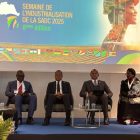Wisin Growers
Once upon a time in the land of Africa communities lived freely and purposefully.
The children’s laughter echoed through villages, while mothers carried them on their backs as they fulfilled daily duties.
At sunrise, men prepared to hunt, contributing to the sustenance of their families.
Elders and local leaders gathered to discuss village matters and report to higher authorities.
Everyone understood their role, and the land was rich in natural gifts abundant, generous, and sustaining.
These settlements were spread across our beautiful continent, our Africa.
As with any growing civilization, changes came with time. When certain resources became scarce, communities innovated and adapted.
Agriculture emerged as a key solution, addressing food shortages and introducing more manageable systems of production.
By observing nature’s elements wind, earth, water, and fire our ancestors developed a deep understanding of seasons and began planting in harmony with them.
Agriculture laid the foundation for stable communities.
Societies could now grow steadily, overcoming internal and external challenges.
We developed our own nourishing diets and lived in balance with nature.
In return, the environment which we revered and cared for sustained us. We were connected, purposeful, and united by shared knowledge and values.
Over time, however, our continent faced a difficult period. Slavery and colonization disrupted this progress.
These events altered our systems and interrupted the cultural and agricultural continuity we had built over centuries. In their place came foreign systems, often introduced without consideration of our context.
Though painful, these events are part of our shared history and from this history, we can draw lessons, resilience, and strength.
Even today, many African nations operate within frameworks that can hinder regional cooperation.
While we are producers of abundant agro-based raw materials, much of the processing and value addition takes place outside the continent, and we often buy back the same goods at a higher price. Yet, Africa has all it needs natural resources, capable minds, and thriving markets to create lasting change.
Rather than look outward, we must reawaken the collaborative spirit of our ancestors. In the past, when one village lacked a resource, messengers would be sent to another.
Through trade, they addressed their needs and strengthened their bonds. The same can apply today. We can promote intra-African trade, knowledge exchange, and innovation to build more resilient agricultural systems and sustainable livelihoods.
As we adopt modern lifestyles, we must also honour and integrate the wisdom of our past. Embracing our traditional foods, cultural values, and spiritual principles can enrich and strengthen our agricultural future.
Reclaiming this heritage does not mean rejecting progress; it means defining it on our terms with balance, health, and sustainability at the core.
Africa is well-positioned for growth. Agribusiness opportunities exist in every value chain from production and processing to packaging and distribution. These opportunities can create multi-billion-dollar enterprises, empowering our youth, enriching communities, and building an inclusive, thriving economy.
Let us begin by building local systems that work. From there, we can scale up regionally and, eventually, globally. The dream is not far-fetched.
Africa is already a sleeping giant full of potential, full of life, and full of spirit.
Like the sub-Saharan lion that sees an elephant not as an obstacle, but as a challenge it can rise to meet we too must act boldly, with clarity and courage.
Let us remember the phrase, “We are what we eat.” And with sincerity, let us acknowledge that many begin to think of freedom and progress only after their basic needs are met.
With collaboration, innovation, and commitment to agricultural development, Africa can move forward — not alone, but together.
The author is Eng. Tapuwa Justice Mashangwa, GCEO of Emerald Investments, CEO of DataFarm and Emerald Agribusiness. He can be contacted on +263 771 641 714 or tjmashangwa@gmail.com














